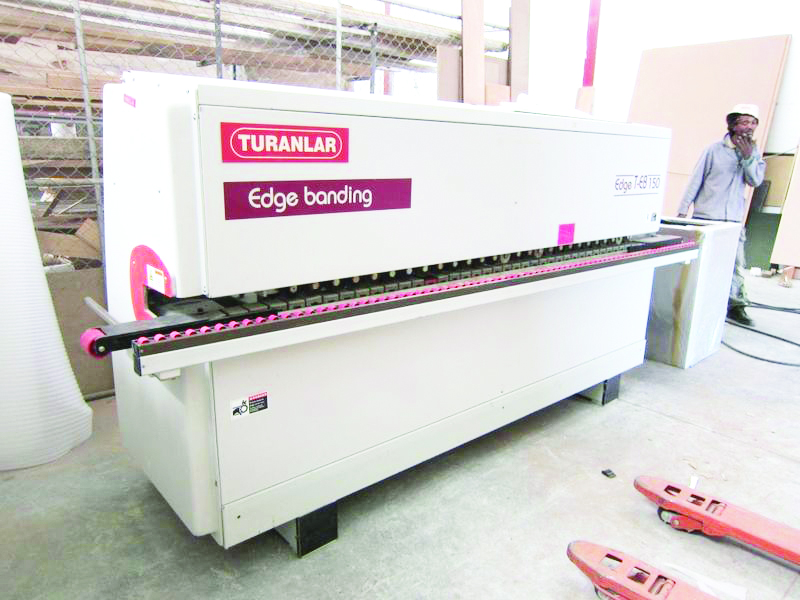Bereng Mpaki
OVER the years, factory shells constructed by the Lesotho National Development Corporation (LNDC) have ended up being occupied by large foreign companies while most local enterprises struggled to fulfil the requirements needed to secure space.
However, Quattro-M Industries — a Basotho-owned firm that manufactures wooden furniture — is among the four indigenous companies bucking that trend after being allocated factory space at the recently-completed Tikoe Industrial Area.
Quattro-M Industries was established by three entrepreneurs in 2014 to address the shortage in furniture in the country. According to Quattro-M chairperson, Thabanag Mosena, the company imports timber from South Africa which they process to manufacture a range of office and home furniture.
“Our company currently buys raw untreated timber from South Africa which we cut up to make smaller planks for manufacturing furniture,” he told the Lesotho Times this week.
He said a shortage of furniture products in the country inspired the founders to go into business, with the added intention of contributing towards job creation in the country.
“We wanted to fill the gap of furniture products in the country which would also enable us to contribute to the economic development of our country,” said Mr Mosena, adding that the firm currently employs 21 people.
Quattro-M Industries currently serves the local market, although plans are in the works to export their products to the southern Africa region. The company also intends to establish a paper mill to produce various paper products and reduce Lesotho’s dependence on South Africa in that sector.
“The sawdust we produce from cutting the wood has given us an opportunity to produce paper products, although this will be effected at a later stage.”
Explaining the benefits of being allocated space at Tikoe Industrial Area, Mr Mosena said the large area would afford the company’s various departments — production, administration, sales and merchandising — to operate in one place.
Quattro-M Industries currently operates from three premises in Lithabaneng, Ha-Lethole and the production base in Ha-Tsolo which Mr Mosena said had negative cost implications.
“Also, due to the dust pollution emitted during the cutting of timber, it was necessary to move to a suitable place that would not pose a health threat to the community,” he said.
Mr Mosena said their predicament compelled them to look for an alternative premises and applying for space at the LNDC.
He said the investment and trade promotion agency played a key role in mentoring them as well as ensuring they met the requirements for getting space at Tikoe Industrial Area.
“As much as we thought we knew what we were doing, we realised there was a lot to learn after the LNDC required us to produce well-articulated business models and financial plans,” reminisced Mr Mosena.
“The LNDC were very helpful in assisting us to put all those things together, which in the end helped us to secure space at the Tikoe Industrial Area.”
The assistance, he said, also resulted in Quattro-M Industries benefiting from the Partial Credit Guarantee Scheme which is run by the government through the LNDC in collaboration with commercial banks to help enterprises get access to funding.
However, with the construction of the factories having been completed last September and tenants already moving in, Quattro-M Industries is still grappling with the challenge of relocating its bulky machinery from their current base to the factory shells.
“We were supposed to have already moved to the space, but we are experiencing challenges in moving our cumbersome machinery to the factory,” said Mr Mosena.
“The machinery needs to be disassembled and lifted with a crane through the roof of the building so that it can be put into the factory.”
He added: “Other possible ways of moving the equipment into the factory would be to break down part of the factory’s wall structures. So, we have submitted all of those plans to the LNDC.
“However, since the building is still under the care of the contractors, negotiations between them and the LNDC are underway at the moment.”
Mr Mosena said the company was doing so well, they were receiving offers from investors for partnership, while others wanted to take over the business.
“We are receiving many orders from clients. Currently, we are working on a big order for a major project in the country,” he said.
“We have had a lot of offers from established businesses in South Africa wanting to partner us, while others want to take over. We are currently assessing the proposals.”
Some of the challenges the business has encountered include skills shortages and having to import their raw materials from South Africa.
“What we intend to do, ultimately, is to secure land on which we can plant trees for timber to reduce our dependence on South Africa,” said Mr Mosena.
“We have also been looking for a chief executive officer for some time, and we are yet to find the right candidate.”
He also called for the regulation of furniture imports to protect local industries.
“It would be nice if the authorities would start controlling the importation of furniture now that there are local enterprises manufacturing such products in Lesotho,” added Mr Mosena.


